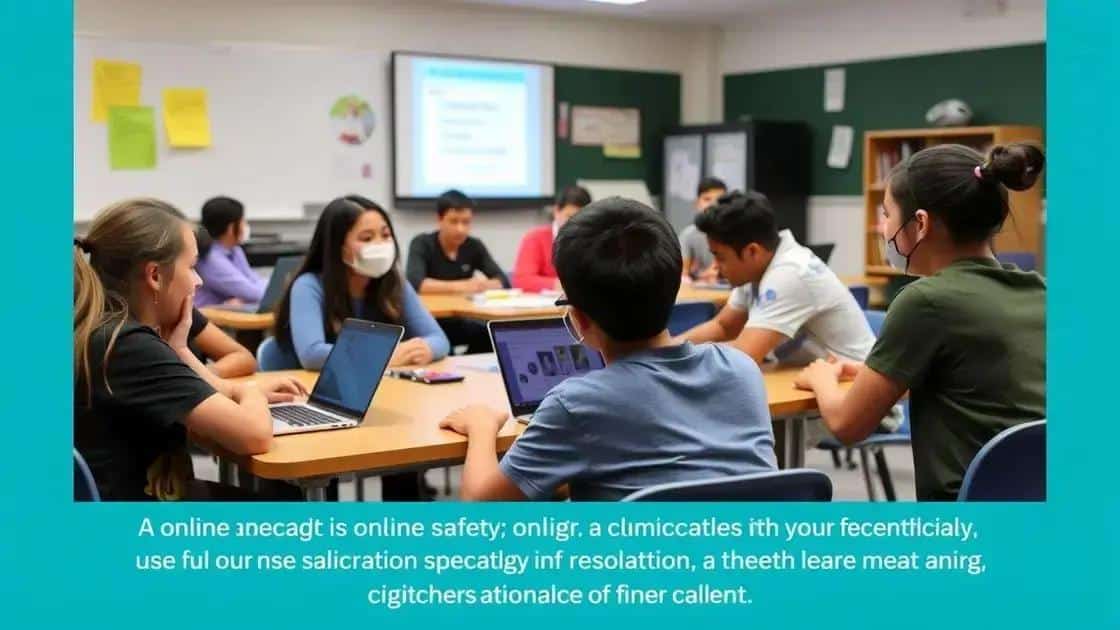Digital citizenship curriculum importance in modern education

Digital citizenship curriculum importance lies in teaching students essential skills for responsible online behavior, ensuring their safety, ethical use of technology, and effective communication in a digitally connected world.
Digital citizenship curriculum importance is becoming increasingly clear as technology shapes our lives. Have you ever wondered how schools prepare students for online interactions? This article delves into the essentials of teaching digital citizenship effectively.
Understanding digital citizenship
Understanding digital citizenship is crucial in today’s technology-driven world. As students navigate the online landscape, they must learn how to use the internet responsibly and ethically. Digital citizenship encompasses online safety, privacy, and respectful communication.
Key Aspects of Digital Citizenship
To fully grasp digital citizenship, it’s essential to explore its key aspects. These include:
- Online safety: Knowing how to protect oneself from cyber threats.
- Digital etiquette: Practicing respectful online communication.
- Information literacy: Understanding how to discern credible information from misinformation.
Each of these components plays a vital role in helping students become responsible digital citizens. By embedding digital citizenship into the curriculum, educators can equip students with the tools they need to thrive in the digital age.
Why Digital Citizenship Matters
The importance of digital citizenship cannot be overstated. With the rise of social media and online interactions, students face new challenges that require critical thinking and awareness. Having a solid foundation in digital citizenship helps students navigate these challenges effectively.
Moreover, when students understand the implications of their online actions, they are less likely to engage in harmful behaviors. Educators play a critical role in guiding students through this process, creating a safe learning environment where discussions about online behavior can occur.
Incorporating digital citizenship lessons can lead to improved outcomes, such as enhanced critical thinking skills and responsible decision-making. As students recognize their rights and responsibilities, they develop a sense of empowerment and agency in the online world.
Key components of a digital citizenship curriculum

Key components of a digital citizenship curriculum ensure students are well-prepared for online interactions. These components provide a solid foundation for teaching responsible online behavior. By focusing on these elements, educators can create a more effective learning environment.
1. Online Safety
One of the most crucial elements is online safety. Students must learn how to protect their personal information and recognize potential threats. Understanding how to create strong passwords and the importance of privacy settings are essential skills. Regular discussions around current cyber threats can reinforce this knowledge.
2. Ethical Use of Technology
Ethical use of technology is another vital component. This includes respecting copyright laws and practicing academic integrity. Students should be taught the consequences of plagiarism and the value of original work. By fostering a culture of respect, students learn to honor the digital content created by others.
3. Digital Communication
Effective digital communication is key in today’s age. Teaching students how to communicate respectfully and effectively online can significantly impact their relationships. This includes understanding tone, context, and the importance of thinking before posting. Through role-playing and guided discussions, students can practice appropriate online interactions.
4. Digital Footprint Awareness
Finally, being aware of one’s digital footprint is essential for students. They should understand that their online actions contribute to their personal brand. Educators can guide students through exercises that illustrate how online behaviors can affect future opportunities, such as college admissions or job prospects.
Incorporating these key components into a digital citizenship curriculum allows students to navigate the online world confidently. As they develop these skills, they become responsible digital citizens who can contribute positively to their communities.
Benefits for students and educators
The benefits for students and educators in a digital citizenship curriculum are substantial and far-reaching. Not only does it empower students with essential skills, but it also supports educators in creating a more effective learning environment.
Students’ Benefits
For students, the advantages are immediate and impactful. First, they develop critical thinking skills that help them navigate the complexities of the digital world. Understanding how to assess online information prepares them for academic success and informed citizenship.
- Improved online safety: Students learn to protect their personal information and to recognize cyber threats.
- Increased engagement: Interactive lessons about digital citizenship can capture students’ interest and encourage participation.
- Stronger communication skills: Students gain proficiency in expressing themselves clearly and respectfully in online discussions.
Educators’ Benefits
Educators also reap significant rewards. By integrating digital citizenship into their teaching, they foster a safer classroom atmosphere. It encourages a culture of respect and responsibility among students.
Additionally, teachers can save time by addressing common online issues upfront, reducing incidences of cyberbullying and misunderstandings. With clear guidelines, educators can focus more on teaching rather than managing conflicts.
Incorporating digital citizenship into the curriculum also enhances teachers’ roles as facilitators of digital literacy, allowing them to guide discussions on relevant topics and emerging trends.
Ultimately, both students and educators benefit from a curriculum that promotes understanding and responsible behavior, creating a more positive educational experience for all.
Challenges in implementing digital citizenship education

Implementing digital citizenship education comes with several challenges that educators must navigate. These challenges can hinder the effective teaching of important digital skills and responsible behaviors. Understanding these obstacles is vital for creating a successful curriculum.
1. Lack of Resources
One major challenge is the lack of resources. Schools often struggle with limited funding, which can restrict access to the necessary technology and materials. Without the right tools, teaching digital citizenship effectively becomes difficult.
- Outdated technology: Many schools may have equipment that cannot support current software.
- Insufficient training: Educators may not have the proper training to teach digital citizenship topics comprehensively.
- Limited lesson plans: There may be a lack of established curricula that can provide a foundation for teaching this subject.
2. Varying Levels of Student Awareness
Another challenge is the varying levels of student awareness regarding online behavior. Not all students come to class with the same knowledge of digital safety and responsibility. Some may be unaware of the consequences of their actions online.
Addressing these differences can require additional time and tailored instruction, making it challenging to create a cohesive learning environment. Teachers often need to assess students’ prior knowledge and adapt their lessons accordingly.
3. Keeping Up with Rapid Changes
Technology evolves quickly, leading to another challenge in implementing digital citizenship education. Today’s digital landscape is constantly changing, with new social media platforms and tools emerging regularly. Educators must stay informed about these changes to provide current information. However, keeping up with the latest trends can be overwhelming and requires substantial professional development.
Additionally, students are often more familiar with new technology than their teachers, which can lead to a communication gap. Building a curriculum that adapts to change while remaining relevant is crucial.
In conclusion, implementing a digital citizenship curriculum offers numerous benefits for both students and educators. While challenges exist, such as limited resources, varying levels of awareness, and the rapid pace of technological change, the rewards of fostering responsible online behavior far outweigh these obstacles. By addressing these challenges, schools can create a safe and engaging learning environment that prepares students to thrive in a digital world. It is crucial to prioritize digital citizenship education to empower the next generation.
FAQ – Frequently Asked Questions about Digital Citizenship Education
What is digital citizenship?
Digital citizenship refers to the responsible use of technology and the internet, including online safety, ethical behavior, and respectful communication.
Why is a digital citizenship curriculum important?
A digital citizenship curriculum teaches students essential skills to navigate the online world safely and responsibly, preparing them for future challenges.
What are some challenges in implementing digital citizenship education?
Challenges include limited resources, varying levels of student knowledge, and the need to keep up with rapid technological changes.
How can educators overcome challenges in teaching digital citizenship?
Educators can collaborate with parents, utilize available resources, and continuously update their knowledge to create an effective learning environment.






